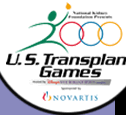|
Later, she moved to South Carolina and got a second chance
at a new kidney, when Dr. Prabakhar Baliga performed her
transplant at the Medical University of South Carolina.
This one fit like a glove and worked well-- she's made a
terrific recovery and has returned to many active pursuits.
As Ms. O'Dell told me this story, I found myself almost
holding my breath in anticipation of the outcome, even though
it was obvious as she was standing there that everything
must have turned out for the best. I was amazed by her courage
and tenacity in the face of unfortunate circumstances and
transplant complications. She refused to give in to adversity
and was totally confident that she would recover. Her constant
smile and upbeat attitude were infectious.
As she concluded her story, I thanked her for sharing
her experiences. Up to that point, I had been just one of
the TransWeb volunteers in purple polo shirts, running around
the 2000 U.S. Transplant Games taking photographs, recording
interviews, and writing stories about the miraculous human
drama that is transplantation. But without knowing it in
advance, the story had turned more personal than I had anticipated.
 |
You see, I am a transplant surgeon, one
of a small number who has had the privilege to attend
the U.S. Transplant Games. It turns out that serendipity
brought Natalie O'Dell and me together, because I had
trained both Dr. Burtch and Dr. Baliga at our transplant
program at the University of Michigan Transplant Center.
|
There was a mixture of pride and guilt, concern and relief,
knowing that surgeons I had personally trained had gotten
her into a maze and safely out the other end. There was
the inevitable sense of responsibility and personal pain
that one feels when things go awry in transplantation. Patients
and their families expect surgeons to be responsible, and
they count on us for support, strength, and guidance in
difficult times. But there is little room for self-doubt,
guilt, or pain. We are trained to keep those emotions to
ourselves. We're supposed to act superhuman even though
we're not.
On telling Ms. O'Dell of my circuitous connection to her,
she shrieked with joy. She embraced me and exclaimed, "Wait
till I tell Momma about you!"
She promised to get in touch with both surgeons and let
them know that she had met me, and I promised to do the
same. It made me feel good to have met her.
Ms. O'Dell's story was not unique. She was one of 1700
recipient athletes competing with transplanted organs at
the 2000 U.S. Transplant Games in Florida. From the minute
the games opened Wednesday night with inspiring remarks
from U.S. Transplant Games spokesman Carl Lewis, transplant
recipients Sean Elliott and Larry Hagman, and donor father
Jeff Wetzell, the stage was set for moving and powerful
experiences. Ms. O'Dell and others like her filled the stadium
that opening night for a joyous and exhilarating Olympics
style opening ceremony.
Contrast the joyousness of that event with the poignancy
of the National Donor Recognition Ceremony on Thursday afternoon,
where over 1100 donor families and living donors gathered.
Not even the boxes of Kleenex at the end of each and every
row of seats were enough to contain our tears. Hundreds
of names were read and candles were lit, highlighting incredible
generosity in the face of tragedy and selflessness in aid
of others.
In the end, the awarding of transplant athlete and courage
medals and the extinguishing of the torch at the Closing
Ceremony of the 2000 U.S. Transplant Games on Saturday night
were important but strangely anticlimactic. Perhaps the
emotional well of participants and spectators alike was
finally empty, drained after having served up so many buckets
of courage, spirit, and character.
I finally feel like I know what transplantation is all
about. Now that I've glimpsed it, you can bet that I'll
be back in 2002.
|

